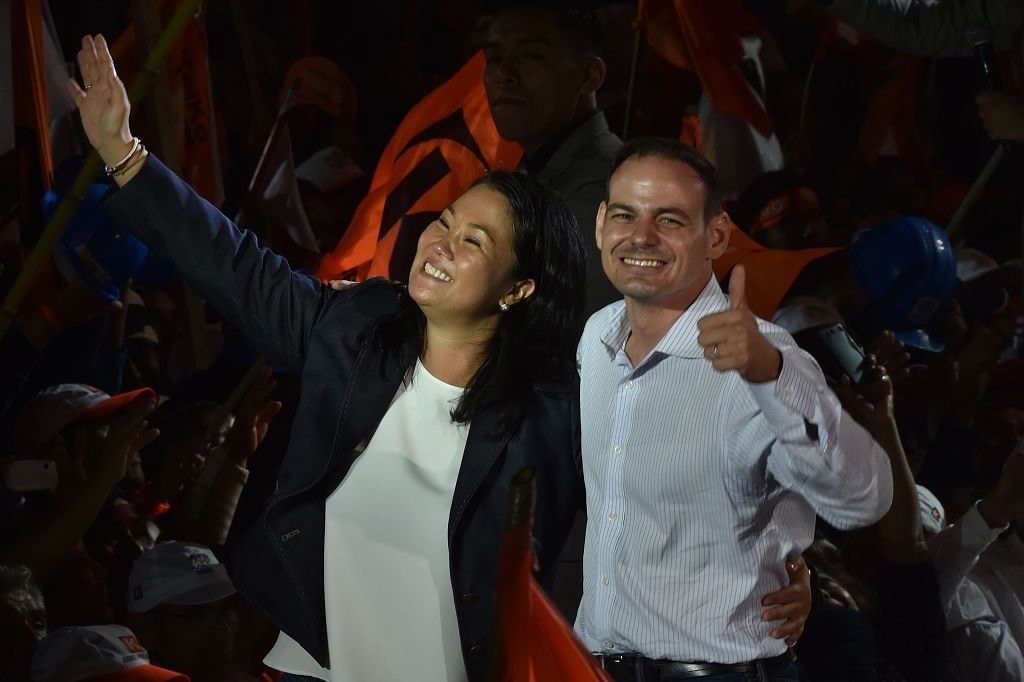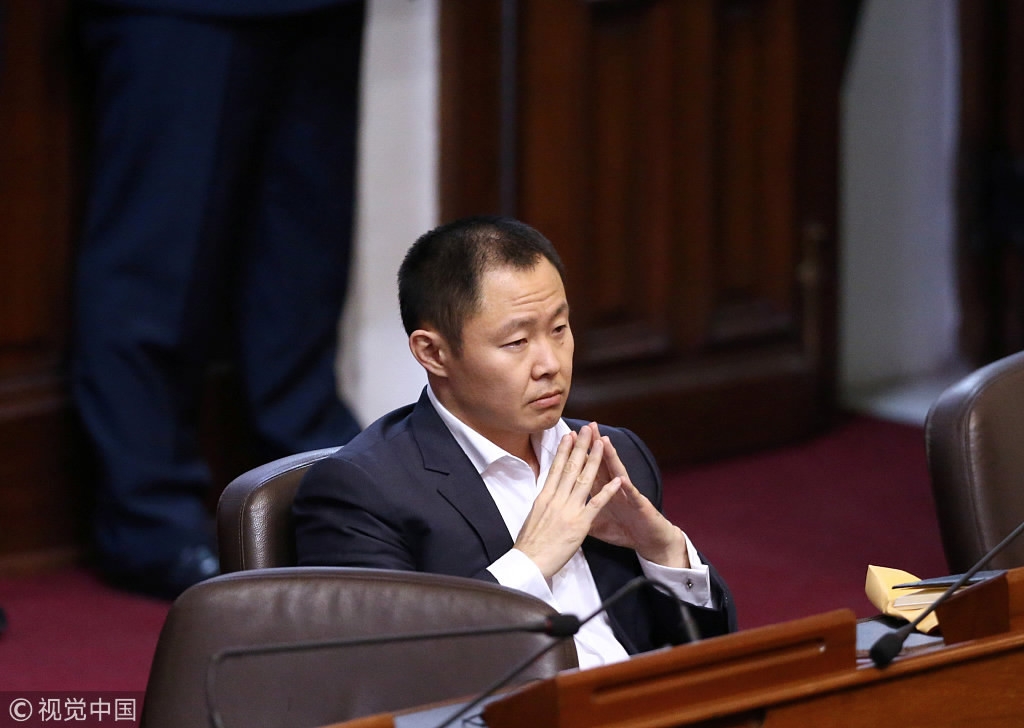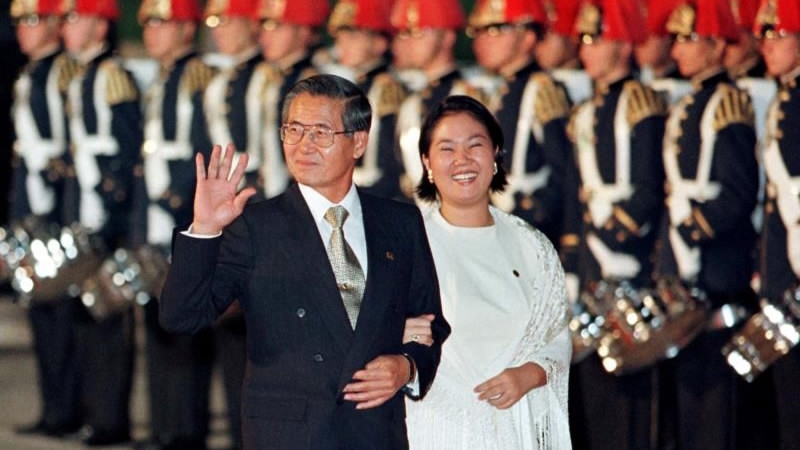After serving 10 years of his 25-year prison sentence, former Peruvian president Alberto Fujimori received the gift of a presidential pardon on Christmas Eve, sending shockwaves through Peru’s already tumultuous politics.
Many view the pardon as a political reward to Alberto’s son, Kenji Fujimori, for leading a congressional faction last week that abstained from voting in President Pedro Pablo Kuczynski’s impeachment hearings, and narrowly saving Kuczynski’s political career.

Kenji Fujimori, Alberto's youngest son, tweeted a video of the moment they learned about the presidential pardon, Dec. 25, 2017 /Screenshot from Kenji's Twitter account
Kenji Fujimori, Alberto's youngest son, tweeted a video of the moment they learned about the presidential pardon, Dec. 25, 2017 /Screenshot from Kenji's Twitter account
The move has sparked protests, clashes with the police and thrust the Fujimori clan back into the spotlight. Alberto, his daughter Keiko and his youngest son Kenji have been pervasive figures in Peru’s politics since the 1990s when Alberto rode onto the political scene on a tractor, ultimately winning the presidential election in a surprise upset.
Since then – in a tale stranger than fiction – Alberto has gone from president of Peru to public enemy number one, Keiko has unsuccessfully tried to succeed her father as president twice and Kenji has seized the events surrounding his father’s pardon to his own political advantage. As the Fujimori legacy perseveres, we review how these three came to power and the role they continue to play in shaping the country’s politics.
A decade under Alberto Fujimori’s iron fist
Now a polarizing figure, 79-year-old Alberto Fujimori was once a virtual unknown, when he ran for president in 1990. Running under the banner of “Cambio 90” – cambio meaning change in Spanish – Fujimori gained support from Peru’s Indian and overwhelming poor majority.
The son of Japanese immigrants, Fujimori used his ancestry to build bonds between himself and Peru’s indigenous population, sharing the identity of an “outsider.” Up against famed novelist Mario Vargas Llosa, who indigenous voters viewed as a part of Peru’s white elite, Fujimori’s grassroots campaign scored a major upset, beating Vargas Llosa in a runoff in June 1990.
Fujimori’s first five-year term revealed his authoritarian leadership style, marked by a “self-coup” in April 1992, where he suspended Peru’s constitution and dissolved Congress. Citing the need to reorganize government "for an honest and efficient administration of justice", Fujimori justified the move as a way to keep the country from collapsing.

Former Shining Path leader Abimael Guzman and other Shining Path members attend a trial at a high security naval prison in Lima. Fujimori’s defeat of Shining Path was one of his primary achievements, February 28, 2017. /VCG Photo
Former Shining Path leader Abimael Guzman and other Shining Path members attend a trial at a high security naval prison in Lima. Fujimori’s defeat of Shining Path was one of his primary achievements, February 28, 2017. /VCG Photo
Despite the dictatorial methods, his first term saw two significant accomplishments: The successful capture of guerrilla group leader Abimael Guzman and the drastic reduction of Peru’s inflation from 7,000 percent to 15 percent in four years.
The capture of Guzman effectively ended the Shining Path insurgency, which had caused more than 20,000 deaths since 1980. And Fujimori’s drastic economic measures sparked an economic boom that gave Peru the fastest-growing economy in the Americas in 1993-1994.
This wave of support carried Fujimori to win a second term in 1995, despite accusations from his ex-wife Susana Higuchi, that she was tortured on Fujimori’s orders. The former first lady even went as far as going on a hunger strike to prevent him from winning re-election. Fujimori ended up easily winning re-election with over 60 percent of the vote.
Scandal, exile and a 25-year prison sentence
Fujimori’s strongman tactics caught up to him in 2000 when a local TV station broadcast footage of Vladimiro Montesinos, widely believed to be Fujimori’s right-hand man working in the shadows, handing out cash bribes to lawmakers on the president’s behalf. Over 2,400 tapes were captured by Montesinos showing Fujimori’s aides manipulating everything from government purchases of arms to the granting of bank loans to political allies.

Alberto Fujimori was convicted of human rights abuses and sentenced to 25 years in prison in 2009. /VCG Photo
Alberto Fujimori was convicted of human rights abuses and sentenced to 25 years in prison in 2009. /VCG Photo
Facing charges of corruption and public uproar, Fujimori fled the country, going into a self-imposed exile in Japan for five years. He later faxed in his resignation.
In 2007, Fujimori arrived unexpectedly in Chile on a tourist visa, harboring dreams of another run at Peru’s presidency. Instead, he was promptly arrested by Chilean authorities and extradited to Peru, something that Japan had refused to do.
Peruvians welcomed him back to the country with charges of corruption, murder and human rights abuses. The disgraced president was convicted of human rights abuses in 2009 and sentenced to 25 years in prison.
Keiko Fujimori: Continuing her father’s legacy
Now the leader of the opposition Popular Force party, Keiko has been in politics since the age of 19 when she became Peru’s first lady, following her parent’s divorce.
An ambitious politician, Keiko has run for the presidency twice – losing both times in 2011 and 2016. Her political career has in large part been built on the legacy of her father, which has been both a blessing and a curse.

Keiko Fujimori with her husband Mark Vito Villanella at a rally in Lima during her 2016 presidential bid. Keiko narrowly lost to Pedro Pablo Kuczynski whose margin of victory was just over 42,000 votes, June 2, 2016 /VCG Photo
Keiko Fujimori with her husband Mark Vito Villanella at a rally in Lima during her 2016 presidential bid. Keiko narrowly lost to Pedro Pablo Kuczynski whose margin of victory was just over 42,000 votes, June 2, 2016 /VCG Photo
Like her father, Keiko has enjoyed widespread support from rural areas. She has benefited from her father’s accomplishments for defeating the Shining Path and saving Peru’s economy. However, the Fujimori name has become synonymous with authoritarianism in the eyes of many, and fears of Keiko continuing her father’s autocratic streak follow her political career.
Kenji Fujimori: A budding politician
In contrast to his sister, Kenji is seen as more likable and carries less political baggage than Keiko. Kenji is new to the political scene, only becoming a congressman in 2011, after an unsuccessful bid for governor of the Lima region five years earlier.

Kenji Fujimori from the Popular Force Party was elected to Peru’s congress in 2011. /VCG Photo
Kenji Fujimori from the Popular Force Party was elected to Peru’s congress in 2011. /VCG Photo
The youngest son has been vocal about his father’s release and has openly celebrated his father’s pardon, releasing a video on his Twitter account of the moment he and Alberto learned of the pardon.
There’s wide speculation that Kenji harbors presidential ambitions and will run in the 2021 race. With doctors stating that his father is suffering from “progressive, degenerative and incurable illness,” there is a genuine possibility that Alberto’s death could play in the family’s favor, as the elder Fujimori still has supporters in the country.
No matter what happens to Alberto’s illness, as long as a Fujimori politician exists, Alberto’s legacy will continue to play an inescapable role in the country’s politics.







